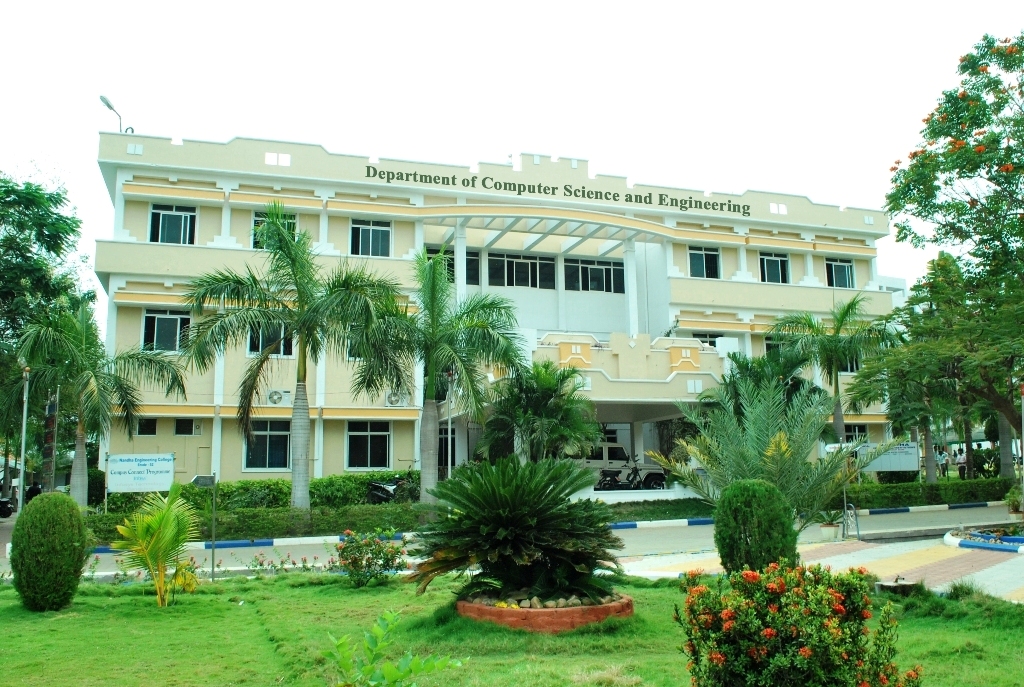DEPARTMENT OF COMPUTER SCIENCE AND ENGINEERING
 |
The Department of Computer Science and Engineering was established in the year 2001. It offers a 4 year B.E (Computer Science and Engineering) programme and 2 year M.E. (Computer Science and Engineering) programme. The department has been recognized as a centre for carrying out Ph.D. Programme under Anna University, Chennai. It has dedicated faculty members specialized in different areas of Computer Science and Engineering.
VISION
To emerge as an eminent department in providing quality professionals, researchers, entrepreneurs with software skills and ethical values to cater to the changing needs of the industry and society.
MISSION
Department of Computer Science and Engineering is committed
- To provide quality education to produce ethically strong Computer Science professionals with social responsibility.
- To impart the necessary domain skills to excel in solving real world problems.
- To create a learner centric platform with ongoing development to fulfill the global computing demands.
PROGRAM EDUCATIONAL OBJECTIVES (PEOs)
The Graduates of Computer Science and Engineering will be able to
PEO 1: Core Competency: Utilize and keep abreast of the latest trends in computer technology as professionals to satisfy the needs of the core industry and society.
PEO 2: Research, Innovation and Entrepreneurship: Apply recent tools, technologies and innovative ideas for leading successful careers in research/ entrepreneurship and to excel in solving real world problems.
PEO 3: Ethics, Human values and Life-Long learning: Exhibit professional ethics in the industry and possess the necessary skills for working in multi-disciplinary areas with focus on life-long learning.
PROGRAM OUTCOMES (POs)
PO 1: Engineering knowledge: Apply the knowledge of mathematics, science, engineering fundamentals, and an engineering specialization to the solution of complex engineering problems.
PO 2: Problem analysis: Identify, formulate, review research literature, and analyze complex engineering problems reaching substantiated conclusions using first principles of mathematics, natural sciences, and engineering sciences.
PO 3: Design/development of solutions: Design solutions for complex engineering problems and design system components or processes that meet the specified needs with appropriate consideration for the public health and safety, and the cultural, societal, and environmental considerations.
PO 4: Conduct investigations of complex problems: Use research-based knowledge and research methods including design of experiments, analysis and interpretation of data, and synthesis of the information to provide valid conclusions.
PO 5: Modern tool usage: Create, select, and apply appropriate techniques, resources, and modern engineering and IT tools including prediction and modeling to complex engineering activities with an understanding of the limitations.
PO 6: The engineer and society: Apply reasoning informed by the contextual knowledge to assess societal, health, safety, legal and cultural issues and the consequent responsibilities relevant to the professional engineering practice.
PO 7: Environment and sustainability: Understand the impact of the professional engineering solutions in societal and environmental contexts, and demonstrate the knowledge of, and need for sustainable development.
PO 8: Ethics: Apply ethical principles and commit to professional ethics and responsibilities and norms of the engineering practice.
PO 9: Individual and team work: Function effectively as an individual, and as a member or leader in diverse teams, and in multidisciplinary settings.
PO 10: Communication: Communicate effectively on complex engineering activities with the engineering community and with society at large, such as, being able to comprehend and write effective reports and design documentation, make effective presentations, and give and receive clear instructions.
PO 11: Project management and finance: Demonstrate knowledge and understanding of the engineering and management principles and apply these to one’s own work, as a member and leader in a team, to manage projects and in multidisciplinary environments.
PO 12: Life-long learning: Recognize the need for, and have the preparation and ability to engage in independent and life-long learning in the broadest context of technological change.
PROGRAM SPECIFIC OUTCOMES (PSOs)
The Students of Computer Science and Engineering will be able to
PSO 1: Conceptualize and use mathematical and algorithmic knowledge to find optimal solutions for engineering problems.
PSO 2: Apply preeminent industry practices, techniques and tools for designing, developing and testing software systems.




